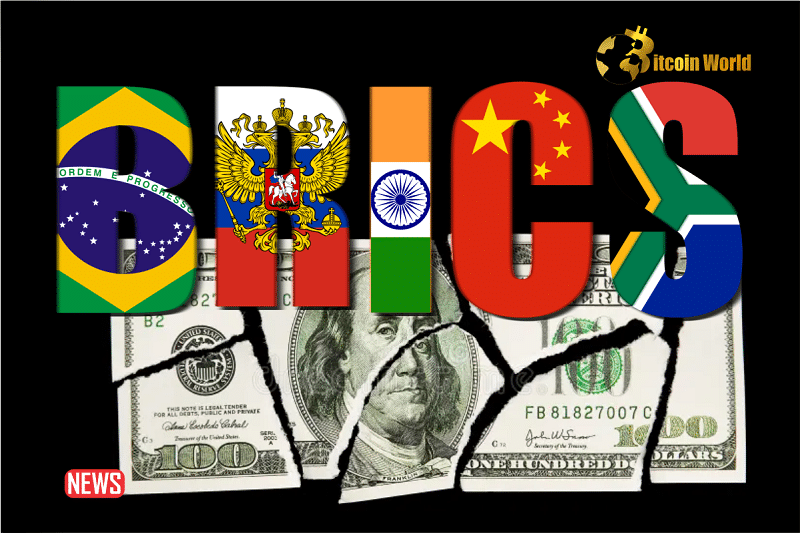Are you watching the global financial landscape shift? The BRICS nations – Brazil, Russia, India, China, and South Africa – are making headlines with a bold move: stepping away from the long-standing dominance of the US dollar. This isn’t just a minor adjustment; it’s a strategic pivot that could reshape international finance as we know it. Imagine a world where economies aren’t tethered to a single currency. BRICS is actively building that future, and it’s happening now.
Let’s dive into the key developments:
- De-Dollarization in Action: BRICS nations are actively increasing financial transactions in their own currencies, aiming to raise a substantial $3 billion, bypassing the US dollar.
- Maharaja Bonds: A New Financial Instrument: The New Development Bank (NDB), the financial arm of BRICS, is introducing ‘Maharaja Bonds’. These bonds are designed to attract investments in local currencies, directly challenging the dollar’s reign.
- Empowering Local Economies: The core goal? To reduce reliance on the US dollar, strengthen their own economies, and gain more financial autonomy.
This isn’t just talk. BRICS is putting concrete plans into action. Let’s explore how they’re doing it.
See Also: BRICS Swears To End US Dollar Dominance In 2024
Unveiling The Maharaja Bonds: What Are They?
The New Development Bank (NDB), a creation of the BRICS alliance, is at the forefront of this de-dollarization push. Think of the NDB as the BRICS’ version of the World Bank, but with a clear mission to promote development outside the traditional Western financial system.
Recently, the NDB announced a significant initiative: to raise $3 billion in local currencies over the next five years. This isn’t just about diversifying their portfolio; it’s a deliberate strategy to move away from dollar dependency. This initiative is designed to bolster local economies and reduce vulnerability to fluctuations in the US dollar’s value.
Enter the ‘Maharaja Bonds.’ The name itself, evoking a sense of grandeur and local heritage, is a clever branding move. But what exactly are they? Essentially, these bonds are instruments designed to attract investment directly in local currencies. Instead of issuing debt in US dollars and then converting it, the NDB is aiming to raise funds directly in the currencies of its member nations.
The message is clear: BRICS is serious about offering alternatives to the US dollar. This move has the potential to fundamentally change how developing nations finance crucial infrastructure projects, offering them a viable path away from dollar dominance.
See Also: BRICS Won’t Succeed In Killing The Dollar: Bank Of America
Why Is This a Strategic Shift in Global Finance?
This isn’t just a minor economic adjustment; it’s a strategic realignment of global financial power. The BRICS alliance isn’t just experimenting; they are actively rewriting the rules of international finance.
Consider this: BRICS has already provided substantial loans in local currencies, like the significant funding to India for a major road project. This demonstrates a clear commitment to using local currencies for large-scale infrastructure development. This approach is a stark contrast to the traditional reliance on US dollar-based financing.
What are the broader implications? The US, while still a major global exporter, is facing increasing competition. China, a key BRICS member, has already surpassed the US in exports, signaling a shift in global trade dynamics. This currency move is intertwined with this broader power shift.
This isn’t solely about economics; it’s also about global influence. By championing local currencies, BRICS is challenging the US dollar’s supremacy and proposing an alternative model for global financial cooperation – one that’s less centered around a single dominant currency.
Furthermore, the expansion of the BRICS alliance to include nations like the UAE, Saudi Arabia, Iran, Egypt, and Ethiopia amplifies this influence. These new members bring significant economic weight and a shared interest in diversifying away from the dollar. This expansion isn’t just about increasing numbers; it’s about building a united front advocating for a more balanced global financial system.
In essence, BRICS is playing the long game. The immediate benefits of de-dollarization are just the starting point. The ultimate goal is to foster a multipolar world where various currencies can coexist and compete on a more equitable playing field. This could lead to a more resilient and less volatile global economy in the long run.
See Also: BRICS Nations To Ditch The USD With Local Currencies For Global Trade
While still in the early stages, the direction is unmistakable. The continued evolution of these BRICS initiatives will likely have profound and lasting consequences on global finance. Keep an eye on how this unfolds – it’s a story that will shape the future of international economics.
The BRICS nations are not just talking about change; they are actively creating it. By embracing local currencies and pioneering financial instruments like Maharaja Bonds, they are directly challenging the US dollar’s long-held dominance. This is more than an economic adjustment; it’s a strategic move towards a more diverse and balanced global financial order.
As these initiatives gain traction, the impact on the US dollar and the global financial landscape will be significant. The BRICS alliance, with its bold and determined approach, isn’t just changing the rules of the game – they’re ushering in a whole new era.
Disclaimer: The information provided is not trading advice. Bitcoinworld.co.in holds no liability for any investments made based on the information provided on this page. We strongly recommend independent research and/or consultation with a qualified professional before making any investment decisions.
Disclaimer: The information provided is not trading advice, Bitcoinworld.co.in holds no liability for any investments made based on the information provided on this page. We strongly recommend independent research and/or consultation with a qualified professional before making any investment decisions.




